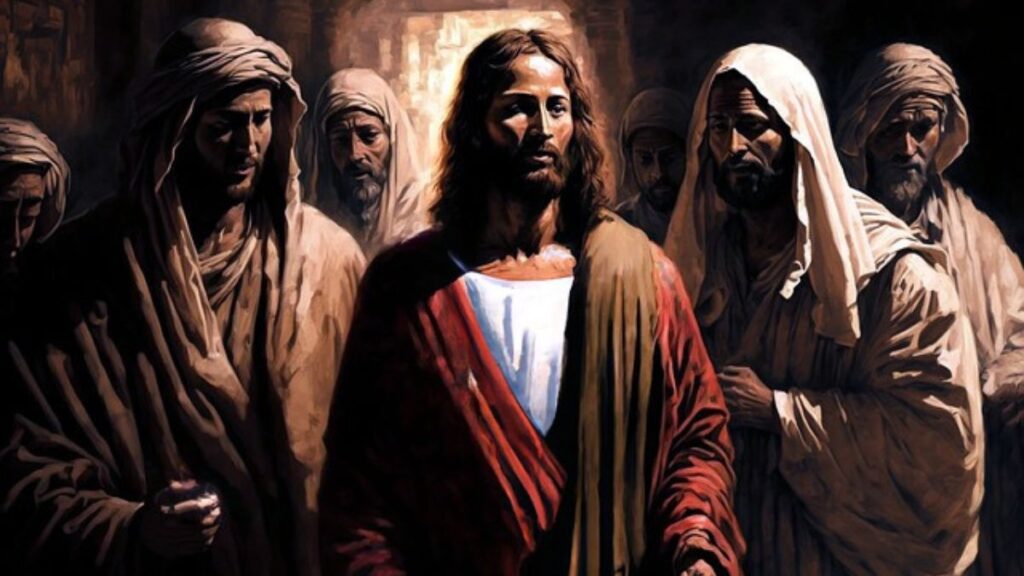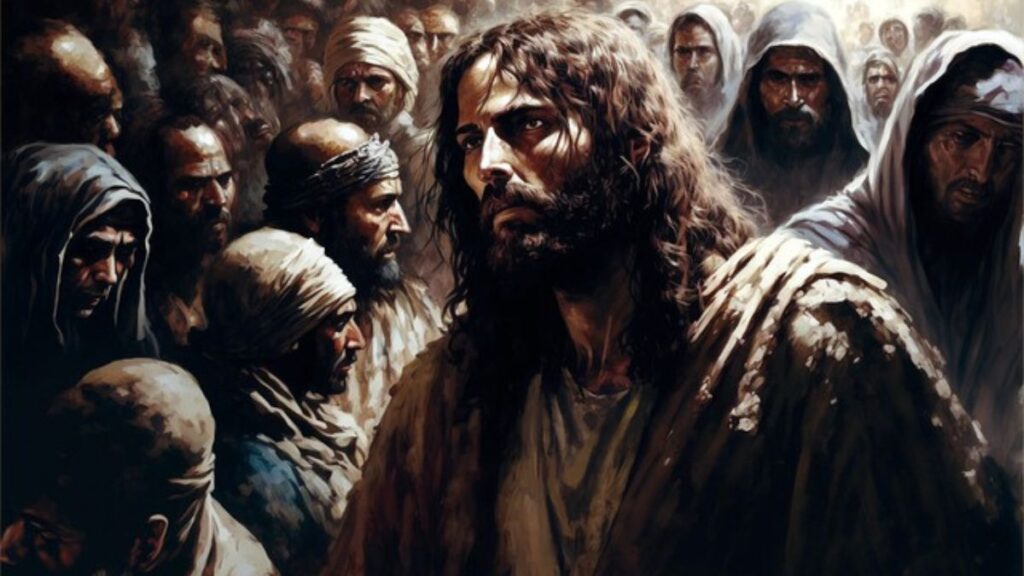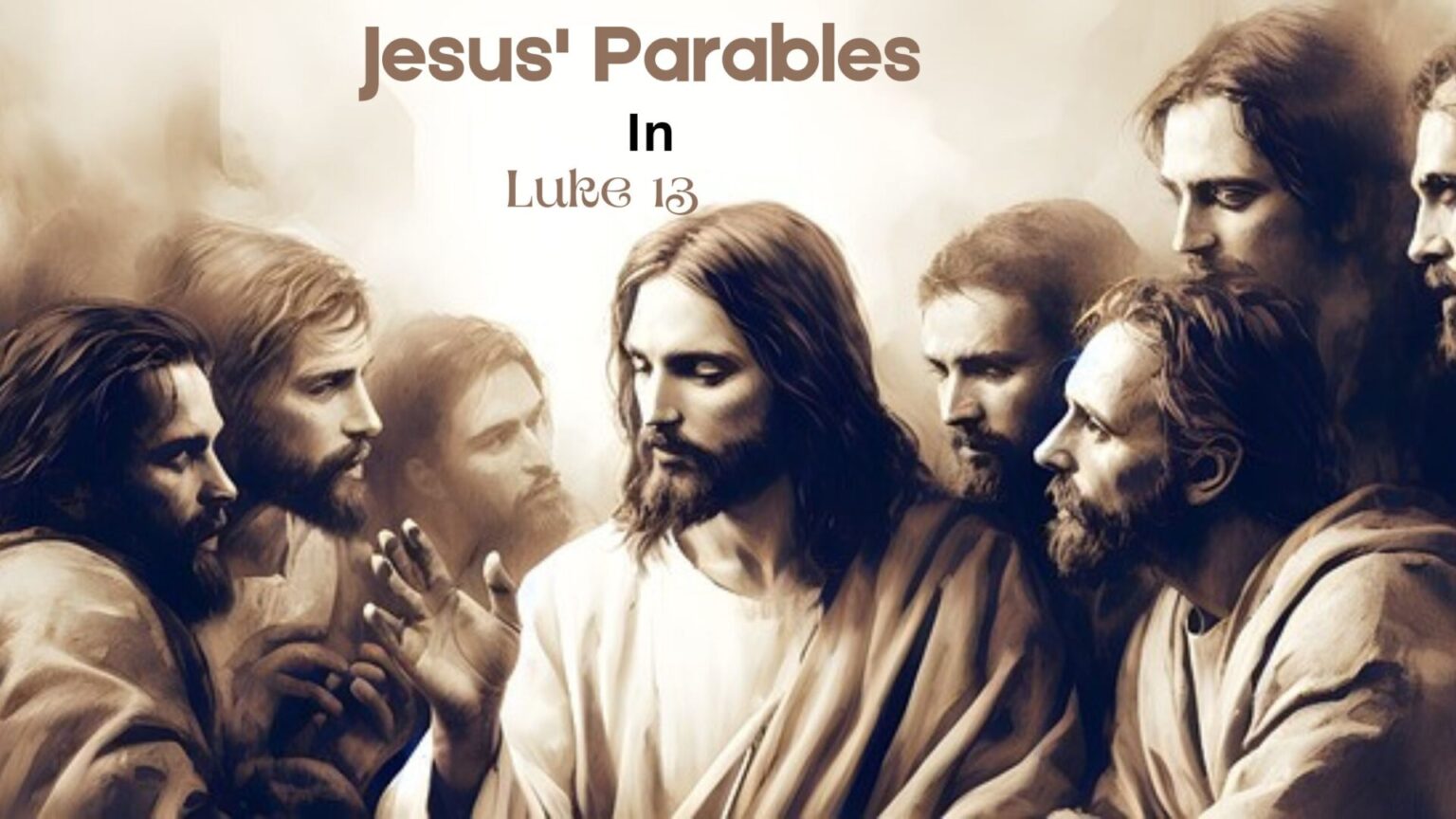Introduction:
Unlocking the Mysteries of the Kingdom: Jesus’ Parables in Luke 13

In the Gospel of Luke, Chapter 13 unveils profound insights into Jesus’ teachings, particularly through the powerful medium of parables. Among these teachings, Jesus unveils the mysteries of the kingdom of God, offering timeless wisdom that transcends generations. In this article, we delve into Jesus’ parables from Luke 13:18-21, exploring their significance and relevance in understanding the kingdom of God.
Why did Jesus’ parables used to teach about the kingdom of God?”
Jesus used parables to teach about the kingdom of God for several reasons:
- Accessibility: Parables use familiar, everyday imagery and situations that the people could relate to. They made complex spiritual truths accessible to a wide audience, including those who might not have understood abstract theological concepts.
- Engagement: Parables are engaging and memorable. By telling stories, Jesus captured the attention of his audience and made his teachings more impactful. People tend to remember stories better than abstract teachings.
- Inclusivity: Parables allowed Jesus to teach profound truths in a way that transcended cultural, social, and educational barriers. Whether someone was educated or not, rich or poor, they could understand and learn from the parables.
- Challenge and Reflection: Parables often contained hidden meanings or layers of interpretation, encouraging listeners to reflect on their deeper spiritual significance. They challenged conventional wisdom and invited people to reconsider their understanding of God’s kingdom.
- Protection: In some cases, Jesus used parables to protect sensitive truths from those who were not yet ready to receive them. By presenting truths in veiled language, he ensured that only those with open hearts and minds would grasp their full meaning.
Overall, Jesus used parables as a powerful teaching tool to convey timeless spiritual truths in a way that engaged, challenged, and inspired his listeners.
“How can we apply the teachings of Jesus’ parables in our modern lives?
The teachings found in Jesus’ parables offer timeless wisdom that remains relevant and applicable to our modern lives. Here are some ways we can apply them:

- Reflection and introspection: Just as the characters in Jesus’ parables faced moral dilemmas and decisions, we too encounter similar situations in our lives. Reflecting on the lessons embedded in the parables can help us make wise choices and live with integrity.
- Humility and compassion: Many of Jesus’ parables emphasize virtues such as humility, compassion, forgiveness, and generosity. By embodying these virtues in our interactions with others, we can foster a more compassionate and empathetic society.
- Justice and equity: Parables like the Good Samaritan challenge us to examine our attitudes towards marginalized and vulnerable individuals in society. They remind us of the importance of standing up for justice and equality, regardless of social status or background.
- Stewardship and responsibility: Parables such as the Parable of the Talents teach us about stewardship and the responsible use of the resources and gifts entrusted to us. We are encouraged to use our talents and resources wisely for the betterment of others and the world around us.
- Persistence and faith: Parables like the Persistent Widow and the Parable of the Mustard Seed highlight the importance of persistence in prayer and faith in God’s promises. They encourage us to persevere in the face of challenges and trust in God’s provision.
- Community and reconciliation: Many of Jesus’ parables emphasize the importance of reconciliation and community. Whether it’s the parable of the Prodigal Son or the Lost Sheep, these stories teach us about the power of forgiveness and the restoration of relationships.
- Countercultural living: Jesus’ parables often challenged the prevailing cultural norms and values of his time. In a similar manner, they invite us to examine our own cultural assumptions and live in ways that align with the values of God’s kingdom, even if they are counter-cultural.
By studying and applying the teachings of Jesus’ parables in our modern lives, we can grow spiritually, cultivate virtues, and contribute to the flourishing of individuals and communities around us.
What are the key lessons from Jesus’ parables in Luke 13?”
In Luke 13, Jesus shares several parables and teachings that convey important lessons for his audience and for us today. Here are the key lessons from Jesus’ parables in Luke 13:
- Repentance and Fruitfulness (Luke 13:1-9): Jesus tells the Parable of the Barren Fig Tree, emphasizing the importance of repentance and bearing fruit in our lives. Just as the fig tree had not produced fruit and faced the threat of being cut down, Jesus warns that those who do not repent will likewise face judgment. The lesson here is the urgency of repentance and the need for genuine spiritual fruitfulness in our lives.
- Healing on the Sabbath (Luke 13:10-17): Jesus heals a woman who had been crippled for eighteen years on the Sabbath, sparking controversy with the synagogue leader. Through this incident, Jesus teaches about the true meaning of Sabbath rest and the priority of showing compassion and mercy to those in need, regardless of societal norms or regulations.
- The Kingdom’s Growth (Luke 13:18-21): Jesus compares the kingdom of God to a mustard seed and yeast, illustrating its small beginnings and eventual expansive growth. This parable teaches us that God’s kingdom often starts small and inconspicuously but gradually transforms and influences the world around it. It encourages us to have faith in the power and growth of God’s kingdom despite its humble beginnings.
- The Narrow Door (Luke 13:22-30): Jesus warns about the narrow door to enter the kingdom of God, contrasting it with the broad road that leads to destruction. He emphasizes the importance of striving to enter through the narrow door, which symbolizes the necessity of genuine repentance and faith in Jesus Christ for salvation. This parable challenges us to take seriously the call to follow Jesus wholeheartedly and to not be complacent about our spiritual standing.
Overall, these parables and teachings in Luke 13 emphasize themes of repentance, compassion, growth, and the urgency of responding to God’s invitation to enter his kingdom. They encourage us to live lives characterized by faithfulness, compassion, and readiness for the kingdom’s coming.
“What is the significance of the mustard seed and yeast in Luke 13?”
In Luke 13:18-21, Jesus uses the parables of the mustard seed and yeast to illustrate key aspects of the kingdom of God:

- Mustard Seed: Jesus compares the kingdom of God to a mustard seed, which is one of the smallest seeds, but when planted, it grows into a large tree where birds can find shelter. The significance of the mustard seed lies in its smallness and seemingly insignificant beginnings. Despite its tiny size, the mustard seed grows into something much larger and provides a place of refuge for birds.
- Significance: This parable highlights the surprising and transformative nature of the kingdom of God. Like the mustard seed, the kingdom may start small and unassuming, but it grows into something expansive and influential. It demonstrates that God’s kingdom often works in ways that defy human expectations and norms.
- Yeast: Jesus also compares the kingdom of God to yeast that a woman mixes into a large amount of flour until it permeates the entire batch of dough. Yeast is a small ingredient, but it has the power to leaven and transform the dough, causing it to rise and become bread.
- Significance: This parable emphasizes the pervasive and transformative nature of the kingdom of God. Like yeast, the kingdom works unseen but has a profound impact on the world around it. It suggests that the influence of God’s kingdom extends into every aspect of life, gradually transforming individuals and societies.
Overall, these parables of the mustard seed and yeast emphasize the surprising growth and transformative power of the kingdom of God. They encourage us to have faith in the seemingly small beginnings of God’s work and to recognize the pervasive influence of his kingdom in our lives and in the world.
Conclusion:
In Luke 13:18-21, Jesus’ parables offer profound insights into the nature and impact of God’s kingdom. Through vivid imagery and timeless truths, we are invited to embrace the transformative power of the kingdom, embodying its values of growth, inclusivity, and renewal in our lives and communities. As we meditate on these parables, may we be inspired to live as faithful ambassadors of God’s kingdom, bearing witness to its enduring influence in the world?
FAQS
- What are parables, and why did Jesus use them?
Parables are simple stories used to illustrate moral or spiritual lessons. Jesus employed parables as a teaching tool because they engaged his audience, making complex spiritual truths accessible and memorable.
- What is the significance of the mustard seed and yeast in these parables?
The mustard seed represents the kingdom’s humble beginnings and unstoppable growth, while the yeast symbolizes its transformative power to permeate and renew all aspects of life.
- How do these parables reflect the inclusivity of God’s kingdom?
The imagery of birds finding shelter in the mustard tree emphasizes the kingdom’s inclusive nature, offering refuge and salvation to people from all walks of life.
- What lessons can we learn from these parables for our lives today? We are encouraged to embrace the kingdom’s values of growth, inclusivity, and renewal, recognizing that even small acts of faithfulness can yield significant impact in God’s kingdom.
References:
- Luke 13:18-21 (New International Version)
- Barclay, William. “The Gospel of Luke.” Daily Study Bible Series. Saint Andrew Press, 1975.
- Morris, Leon. “Luke: An Introduction and Commentary.” Tyndale New Testament Commentaries. InterVarsity Press, 2014.
- Wiersbe, Warren W. “The Bible Exposition Commentary.” David C Cook, 2001.
Conclusion: Jesus’ parables in Luke 13:18-21 offer timeless truths about the nature and impact of God’s kingdom. Through vivid imagery and profound lessons, we are invited to embrace the kingdom’s transformative power and live as faithful ambassadors of its message. As we meditate on these parables and their implications for our lives today, may we be inspired to embody the values of growth, inclusivity, and renewal in our communities, bearing witness to the enduring influence of God’s kingdom in the world.






